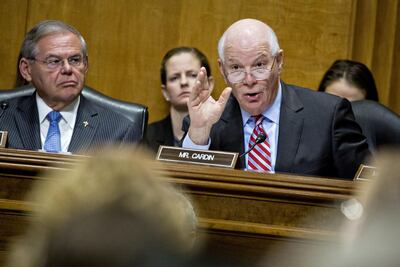Donald Trump's pick for secretary of state told US legislators on Thursday that fixing "the flaws" in the Iran nuclear deal would be a priority for him if given the job.
Revising the 2015 accord was in "America's best interest", Mike Pompeo told Senate Foreign Relations Committee at his confirmation hearing.
The CIA director and former Congressman said that if the deal could not be fixed and Mr Trump withdrew, he would advocate for a tougher accord.
"I want to fix this deal. That is the objective," Mr Pompeo said.
Mr Trump has cited the "sunset clause" in the current accord that limits the duration of the constraints on Iran, and the lack of curbs on its ballistic missile programme as two shortcomings that he wants European allies to agree to fix before a May 12 deadline. He also called fr
Mr Pompeo refused to speculate about Washington's next step if this did not happen. “That’s almost a month away. It depends, clearly, if we’re close,” he said.
Pressed by Senator Ben Cardin on whether the US would withdraw, Mr Pompeo said: “If there’s no chance that we can fix it, I will recommend to the president that we do our level best to work with our allies to achieve a better outcome and a better deal. Even after May 12.”

He suggested withdrawing and reaching a tougher accord with Iran if the changes sought by the US were not met, saying this was Mr Trump’s vision for the current negotiations. “The president has stated his objective, I’ve heard him say it to my predecessor, to Secretary [Rex] Tillerson, I’ve heard him say it, his goal is to take the three shortcomings and fix them.”
He said Iran was not racing to attain a nuclear weapon before the deal in 2015, and there is “no indication it would race to a weapon if we leave the agreement today”.
_______________
Read more:
When the US withdraws from the Iran nuclear deal, expect three stark consequences
Iran's Rouhani says US 'will regret' if it withdraws from nuclear deal
With the appointment of John Bolton, the militarisation of US foreign policy looks more feasible
_______________
Mr Pompeo said Iran was “on the march and has paid too low a price for its dangerous behaviour”.
“Our administration has developed a strategy to counter Iran that will raise that cost,” he said.
“We cannot let the nuclear file prevent us from acting against Iran’s cyber efforts or its attempts to provide missiles to the Houthis to attack Saudi Arabia and Americans who travel there.”
Iran’s activities in Syria, Iraq and Lebanon "threaten the very existence of Israel, and the global reach of Hezbollah threatens us right here in the homeland”, he told the committee.
Mr Pompeo also took a hard line on Russia.
“Russia continues to act aggressively, enabled by years of soft policy toward that aggression. That’s now over.”
He said sanctions against Russia and the decision to provide lethal weapons to Ukraine were evidence that Mr Trump’s “national security strategy, rightfully, has identified Russia as a danger to our country”.
"The historic conflict between the United States and the Soviet Union, and now Russia, is caused by Russian bad behaviour," he said.
He confirmed that Russia interfered in the 2016 presidential election, and said the US has an obligation to help Ukraine defend its sovereignty.
Mr Pompeo also reiterated his position to qualify Wikileaks as a hostile entity to the United States, and denied he advocated regime change in North Korea, whose leader Mr Trump is planning to meet next month.


